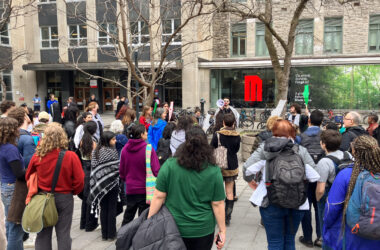On Oct. 15, the Students’ Society of McGill University (SSMU) held its second annual Student Academic Summit to educate students on how to effect change on campus through university governance systems. The summit consisted of discussions focused on university advocacy and addressing upcoming initiatives, including faculty-based mental health programming, McGill’s Draft Policy Against Sexual Violence, the Library Improvement Fund, as well as the Office for Students with Disabilities’ (OSD) new Universal Design for Learning (UDL) toolkit.
According Erin Sobat, SSMU Vice-President (VP) University Affairs and organizer of the event, this year’s summit was targeted not only at student representatives but also anyone interested in effecting meaningful change at McGill.
“Certainly we want not just to reach students who are already involved, but we also want to make sure that [students] have concrete ways to act,” Sobat said. “The goal of this whole day is SSMU playing this coordinating role where we can provide resources, referrals, and contacts for students to take on [these initiatives] because we just don’t have the capacity to do it all, and we’re also not best suited to advocate for something in a particular department, unlike the students who are most engaged in that department or even just students taking classes.”
Sobat admits that McGill’s governance may appear ambiguous to many students. As such, he intended for the summit to clarify policy development in governance structures.
“Understandably, students don’t have a full picture of how the university is structured in terms of governance and decision-making,” said Sobat. “Even for elected [representatives] or elected Senators, it often takes them a few months of their role to actually understand where they fit and everything, and what can they do [….] I hope [the summit] makes [it…] more clear, because it can be intimidating”
A portion of the summit was dedicated to the UDL toolkit, an educational framework meant to accommodate different learning styles. In the presentation, Associate Director of the OSD Tanja Beck emphasized how professors can use the UDL toolkit to provide a more inclusive learning experience and to improve evaluation methods for students without disabilities.
“Professors have a concern that it will lower academic standards, which is really something that we’re not going for at all,” Beck said. “It’s so important for faculty to know what they really want to assess. They need to ask themselves, ‘Am I really assessing if [students] can write by hand or can they also type the essay? Is it really necessary for students to sit down and do a test in 3 hours or can they do it over two days as a take-home exam?’ Once they’ve clearly identified those [priorities], it’s a lot easier to decide when they can be flexible and when they can’t. And that’s really the starting point of UDL.”
According to Elizabeth Reed, U2 Arts student and VP Academic for the Anthropology Students’ Association (ASA), felt that the summit solidified her understanding of students’ rights and introduced her to resources she can recommend to those struggling with their studies.
“It’s been really helpful to hear more about what I can do for the people I’m supposed to represent,” Reed said.
Moreover, for Reed, the summit shed light on how to advance projects as a student representative. She felt the summit was helpful in showing her where she can go for help when trying to enact change in her department.
“It’s hard to find that information somewhere else, so these kind of summits are useful because I found out stuff today […] that could really help my projects and the projects of my colleagues [on the ASA],” Reed said.









